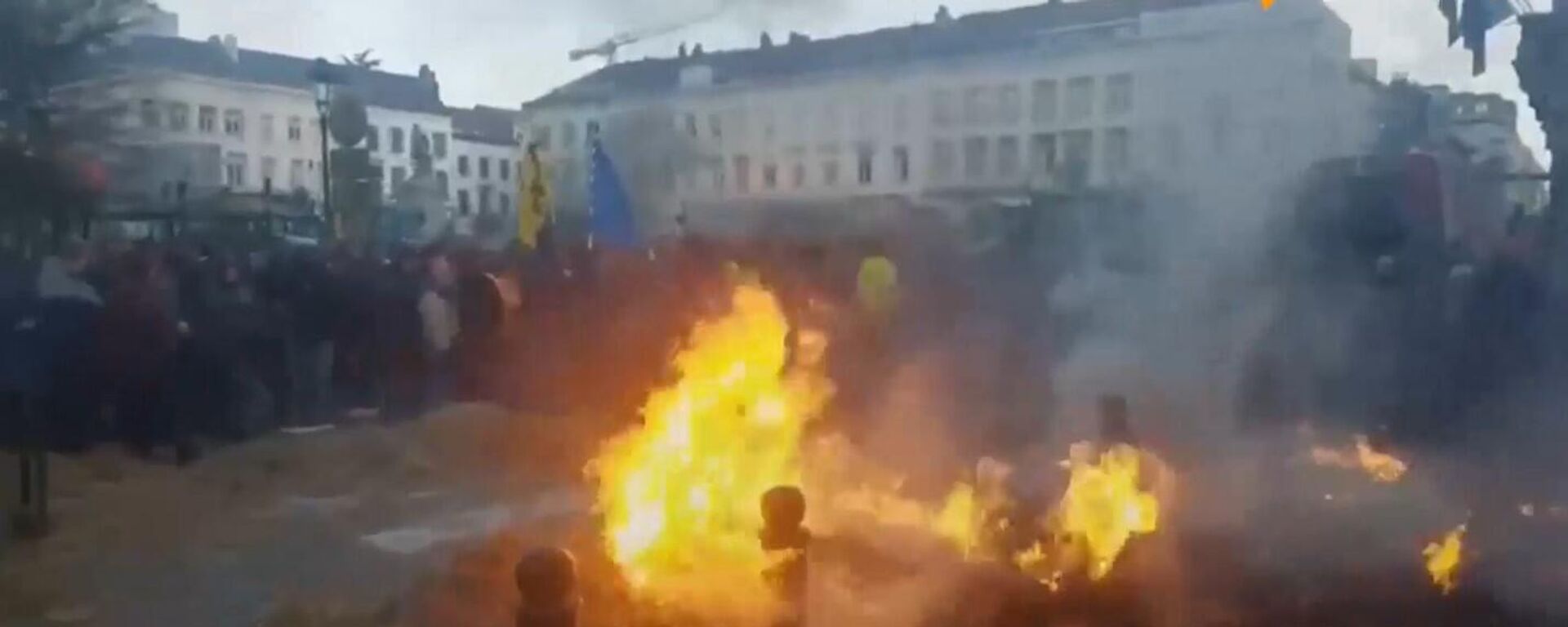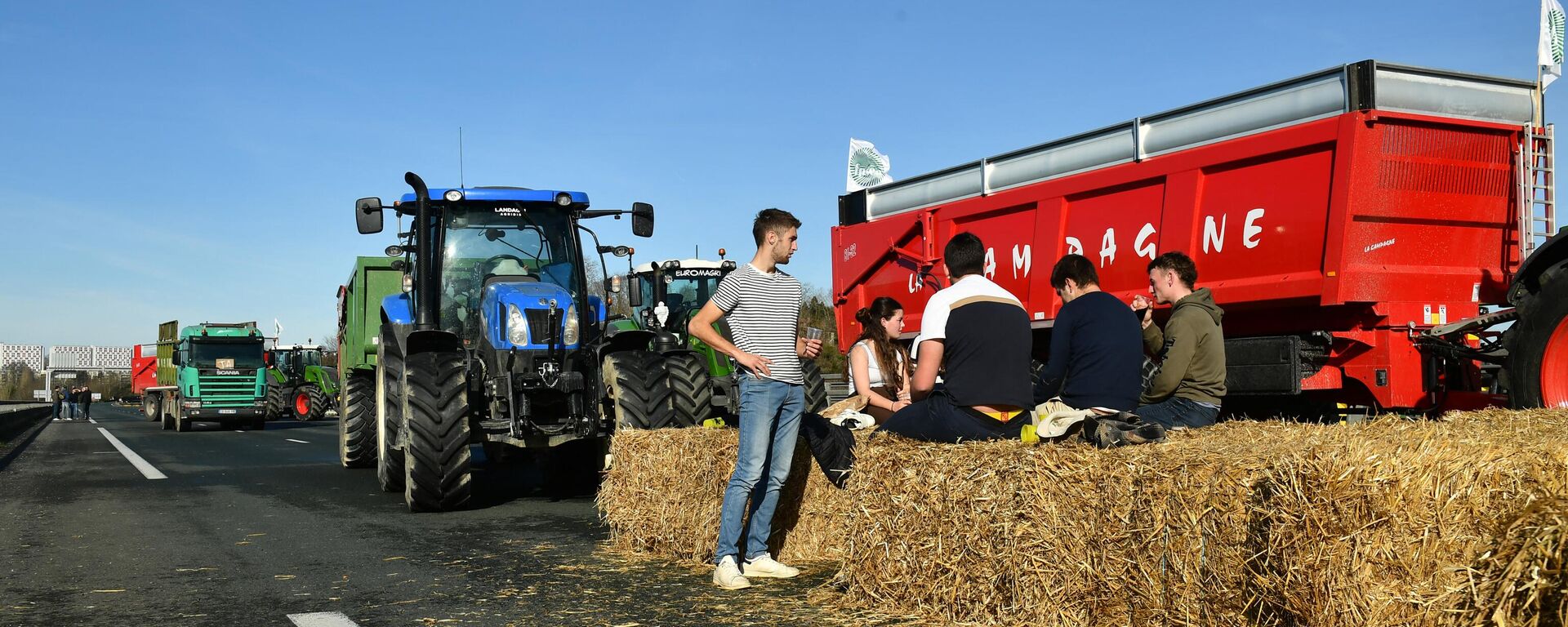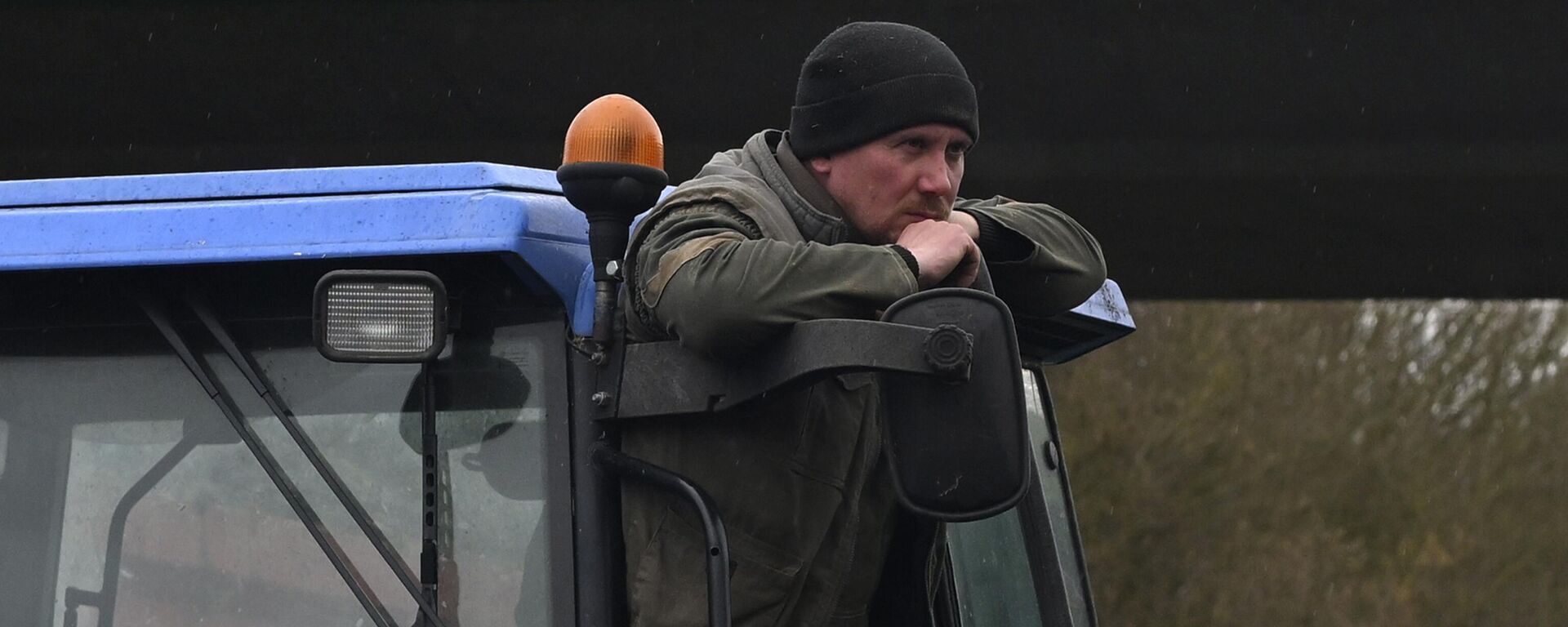https://sputnikglobe.com/20240201/how-eus-ukraine-and-climate-change-adventurism-kill-blocs-farming-1116541935.html
How EU's Ukraine and Climate Change Adventurism Kill Bloc's Farming
How EU's Ukraine and Climate Change Adventurism Kill Bloc's Farming
Sputnik International
Europe has been rocked by growing protests by farmers over low prices, high production costs, green policies and cheap imports. What's behind the growing movement?
2024-02-01T19:10+0000
2024-02-01T19:10+0000
2024-02-01T19:10+0000
europe
world
european union (eu)
opinion
farmer
russia
inflation
recession
economic recession
climate change
https://cdn1.img.sputnikglobe.com/img/07e8/01/18/1116347025_0:160:3072:1888_1920x0_80_0_0_23886775e1f53bf1e2d9af8dfce43cf2.jpg
The farmers' protest movement has been increasingly engulfing Europe since January seeing massive demonstrations in Belgium, France, Germany, Italy, Poland, Romania and the Netherlands.By January 31, the number of farmers protesting across France against the Macron government's agricultural policies had reached 10,000, French Interior Minister Gerald Darmanin admitted.The current situation has reached boiling point thanks to a series of systemic problems in European agriculture sector, according to Josep-Maria Arauzo-Carod, professor of economics at the Rovira i Virgili University (URV), chair of the Research Center on Economics and Sustainability (ECO-SOS).Europe's economic slump, uncertainty over decoupling from Russia's copious energy market and attempts by some states to artificially suppress prices driven up by inflation have only made things worse for the continent's agricultural workers.The influx of cheap food from Ukraine to Europe amid the ongoing conflict with Russia hit farmers hard, prompting Poland, Romania, Bulgaria and Hungary to slap import bans on Ukrainian agricultural goods.The expert argued that European authorities should have accommodated the international flows of goods with European production. He noted that the EU leadership lifted all tariffs and quotas on Ukrainian imports, further reducing their price to ease the transit of Ukrainian commodities via land routes into the bloc."You have one of the traditional problems with the agricultural sector, that this is an industry which is highly subsidized. And when you have plenty of subsidies, your competition capacity is lowered a lot. And this is a challenge for European producers to increase their competitiveness without the support from public authorities," he stressed.Under these circumstances, the "green agenda" pushed by the EU was last straw, the expert said. Arauzo-Carod pointed out that European farmers have had to bear the brunt of energy transition costs. Cuts to farmers' fuel subsidies under the climate agenda by European governments are one of the protesters' major grievances. "And then they are arriving to a point in which in some sectors and places it is very, very difficult to survive," the expert stressed.
https://sputnikglobe.com/20240201/farmers-setting-protest-fires-in-brussels-to-demand-measures-from-eu-leaders-1116536446.html
https://sputnikglobe.com/20240201/over-90-farmers-detained-after-trying-to-take-over-market-near-paris-1116526326.html
https://sputnikglobe.com/20240201/europe-farmer-protests-are-a-consequence-of-ukraine-support-we-shot-ourselves-in-the-head-1116525496.html
russia
ukraine
Sputnik International
feedback@sputniknews.com
+74956456601
MIA „Rossiya Segodnya“
2024
News
en_EN
Sputnik International
feedback@sputniknews.com
+74956456601
MIA „Rossiya Segodnya“
Sputnik International
feedback@sputniknews.com
+74956456601
MIA „Rossiya Segodnya“
farmer protests in europe, eu farmer protests, climate change, fuel subsidies for farmers abolished, cheap agricultural goods from ukraine, eu climate policies, energy decoupling from russia, energy crisis, inflation and recession in eu
farmer protests in europe, eu farmer protests, climate change, fuel subsidies for farmers abolished, cheap agricultural goods from ukraine, eu climate policies, energy decoupling from russia, energy crisis, inflation and recession in eu
How EU's Ukraine and Climate Change Adventurism Kill Bloc's Farming
Europe has been rocked by growing protests by farmers over low prices, high production costs, green policies and cheap imports. What's behind the growing movement?
The farmers' protest movement has been increasingly engulfing Europe since January
seeing massive demonstrations in Belgium, France, Germany, Italy, Poland, Romania and the Netherlands.
By January 31, the number of farmers
protesting across France against the Macron government's agricultural policies had reached 10,000, French Interior Minister Gerald Darmanin admitted.
The current situation has reached boiling point thanks to a series of systemic problems in European agriculture sector, according to Josep-Maria Arauzo-Carod, professor of economics at the Rovira i Virgili University (URV), chair of the Research Center on Economics and Sustainability (ECO-SOS).
"The European agricultural sector has traditionally faced a lot of challenges, especially because, well, it is an industry which is very difficult to compete against production coming in from outside Europe because production costs are much higher here in Europe," Arauzo-Carod told Sputnik. "So obviously without any kind of public intervention local prices are going to be higher than imports. So then there is no room for, let's say, agricultural activity here in Europe. But it is also true that there is a huge amount of public intervention. In fact, agricultural common policy is the most important area in terms of the European budget."

1 February 2024, 13:32 GMT
"In addition to producing food, the sector also has many other contributions, like, for instance, contributions in terms of, territorial balance, in terms of keeping people living in the countryside. And all these, all these, let's say, collateral, activities also are needed. But what's happening right now, and for some years, is that there are a lot of environmental challenges and obviously we are all facing these environmental challenges in all economic activities," the expert continued.
Europe's economic slump, uncertainty over decoupling from Russia's copious energy market and attempts by some states to artificially suppress prices driven up by inflation have only made things worse for the continent's agricultural workers.
The influx of cheap food from Ukraine to Europe amid the ongoing conflict with Russia hit farmers hard, prompting Poland, Romania, Bulgaria and Hungary to slap import bans on Ukrainian agricultural goods.

1 February 2024, 04:43 GMT
"The effect is not exactly from the anti-Russian economic sanctions, but on the import from Ukraine," Arauzo-Carod said. "The structure of the Ukraine agricultural sector is very different from the one in the rest of Europe because in Ukraine, expectations are much higher, which means more efficient. In Europe they are smaller, and additionally the production costs in Ukraine are much lower. Obviously they are competing against European products. And agricultural producers have complained a lot."
The expert argued that European authorities should have accommodated the international flows of goods with European production. He noted that the EU leadership lifted all tariffs and quotas on Ukrainian imports, further reducing their price to ease the transit of Ukrainian commodities via land routes into the bloc.
"You have one of the traditional problems with the agricultural sector, that this is an industry which is highly subsidized. And when you have plenty of subsidies, your competition capacity is lowered a lot. And this is a challenge for European producers to increase their competitiveness without the support from public authorities," he stressed.
Under these circumstances, the "green agenda" pushed by the EU was last straw, the expert said. Arauzo-Carod pointed out that European farmers have had to bear the brunt of energy transition costs.
Cuts to farmers' fuel subsidies under the climate agenda by European governments are one of the protesters' major grievances. "And then they are arriving to a point in which in some sectors and places it is very, very difficult to survive," the expert stressed.
Farmers "feel that they have to pay the entire bill of climate change. And it is true that the agricultural sector contributes a lot to emissions, and that the agricultural sector has to make a great effort in order to change the situation. But this is something that has to be done by all economic activities. So I would prefer a more balanced distribution of this green bill among all industries," he concluded.

1 February 2024, 03:49 GMT





